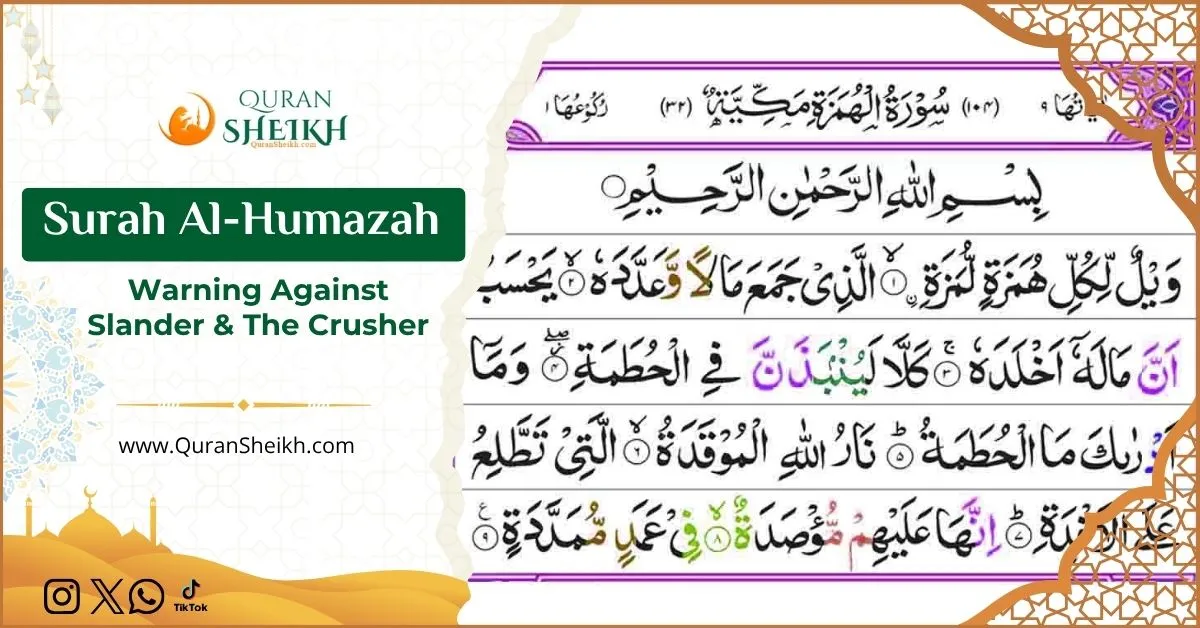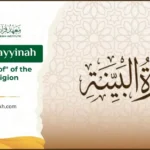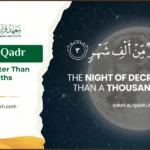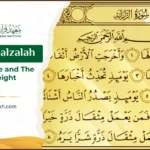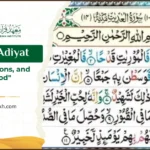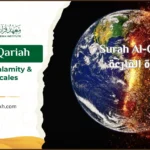Discover the powerful warning in Surah Al-Humazah. Learn the danger of slander, the obsession with wealth, and the terrifying reality of “The Crusher.”
Introduction: The Two Sins We Normalize Every Day
The Surah begins with one of the heaviest declarations in the entire Quran: “Woe…” (Wayl). This is not just a “bad thing”; it is a declaration of destruction and a valley in Hellfire.
Who is this “Woe” for?
This short, 9-verse (Meccan) Surah, Surat Al-Humazah (The Slanderer), is a terrifying diagnosis of a spiritual sickness. It warns against two of the most common—and most normalized—sins in our modern society:
- The sin of the tongue: Tearing people down with our words (gossip, slander, mockery).
- The sin of the heart: An obsessive love of wealth that leads to arrogance and a feeling of immortality.
This Surah is a powerful mirror, forcing us to examine our own words and our own relationship with the material world.
Listen to Surah Al-Humazah: Recitation by Sheikh Mishary Rashid Alafasy
Listen to this beautiful recitation to perfect your pronunciation and reflect on the meanings before reading the explanation.
The Anatomy of Arrogance: Understanding the 9 Verses
The Surah masterfully paints a portrait of a toxic character, linking their actions directly to their corrupt belief system, and then detailing the precise punishment that fits their crimes.
Verses 1-3: The Diagnosis of the Sickness
1. Wai lul-li kulli hu mazatil-lumaza (Woe to every scorner and mocker) 2. Al-lazi jama’a maalaw wa’addadah (Who collects wealth and [continuously] counts it.) 3. Yahsabu anna maalahu akhladah (He thinks that his wealth will make him immortal.)
- The Contemplation: This is a single character profile.
- Their Action (Verse 1): They are a Humazah (a backbiter, a slanderer) and a Lumazah (a mocker, a fault-finder, who scorns others to their face). This is a person who builds themselves up by tearing others down.
- Their Motive (Verse 2): Why are they so arrogant? Because they “collect wealth and continuously count it.” Their life’s purpose is accumulation. Their self-worth is tied directly to their bank account.
- Their Delusion (Verse 3): This obsession leads to a profound delusion. They believe their wealth will make them immortal (Akhladah). They are so engrossed in their worldly possessions that they have forgotten the reality of death and the Day of Recompense. The two sins are linked: their love of wealth makes them feel superior, and this arrogance manifests as mockery of others.
Verses 4-9: The Inevitable Cure (Al-Hutamah)
The Surah then shatters this delusion with a sharp “No!”
4. Kalla layum ba zanna fil hutamah (No! He will surely be thrown into the Crusher.) 5. Wa maa adraaka mal-hutamah (And what can make you know what is the Crusher?) 6. Narul laahil-mooqada (It is the fire of Allah, [eternally] fueled,) 7. Al latee tat tali’u ‘alal-afidah (Which mounts directed at the hearts.) 8. Innaha ‘alaihim moosada (Indeed, Hellfire will be closed down upon them) 9. Fee ‘amadim-mu mad dadah (In extended columns.)
- The Contemplation: The punishment is described in terrifying, specific detail:
- “Al-Hutamah” (The Crusher): He who thought he was “great” and “immortal” will be thrown like a worthless thing to be “crushed.”
- “Fire of Allah”: It is not any fire; it is Allah’s Fire, signifying its power and divine origin.
- “Mounts directed at the hearts” (The most terrifying verse): The sickness began in the heart (greed, arrogance, the delusion of immortality). The punishment, therefore, will not just burn the skin; it will ascend directly to the heart, the very source of the disease, consuming it with a pain that matches the arrogance it once held.
- “Closed down” & “In extended columns”: This is not a temporary punishment. It is an inescapable prison. The gates are sealed shut (Moosada) and held by towering columns (‘Amadim-mumaddadah), signifying the finality of their doom.
The Smart Bridge: The Cure for the Sickness of the Heart
This Surah is a diagnosis of a spiritual cancer. The cancer is arrogance and greed. The symptoms are slander and mockery.
How do we cure this? The Quran itself is the Shifâ’ (healing). Reciting it is the first step, but understanding it is the medicine.
When you truly understand the meaning of Surah Al-Humazah, it becomes a powerful check on your own soul. Before you speak ill of someone, you remember “Woe to every slanderer.” Before you obsess over your career or your possessions, you remember, “He thinks his wealth will make him immortal? No!”
This is the power of learning the Quran with its Tafseer (explanation). It is the only way to purify the heart from the very diseases this Surah warns against. At Quran Sheikh online Quran learning, our expert, one-on-one tutors specialize in this deep, transformative understanding, helping you turn the Quran into a shield for your tongue and a purifier for your heart.
Your Daily Check-in for the Tongue and Heart
Surah Al-Humazah is not just a story about ancient Makkans. It is a daily check-in for every one of us.
It forces us to ask:
- Am I ever a Humazah/Lumazah? (Even in “harmless” gossip or jokes?)
- Is my wealth and status making me arrogant?
- Have I become so focused on “counting my gains” that I’ve forgotten the “Crusher”?
Let this Surah be the guardian of your character, protecting you from the two sins that are so easy to commit, and so devastating in their consequence.
For Reference: Transliteration and Translation
Wai lul-li kulli hu mazatil-lumaza (Woe to every scorner and mocker)
Al-lazi jama’a maalaw wa’addadah (Who collects wealth and [continuously] counts it.)
Yahsabu anna maalahu akhladah (He thinks that his wealth will make him immortal.)
Kalla layum ba zanna fil hutamah (No! He will surely be thrown into the Crusher.)
Wa maa adraaka mal-hutamah (And what can make you know what is the Crusher?)
Narul laahil-mooqada (It is the fire of Allah, [eternally] fueled,)
Al latee tat tali’u ‘alal-afidah (Which mounts directed at the hearts.)
Innaha ‘alaihim moosada (Indeed, Hellfire will be closed down upon them)
Fee ‘amadim-mu mad dadah (In extended columns.)
Frequently Asked Questions About Surah Al-Humazah
What is the main theme of Surah Al-Humazah?
The main theme is a severe warning against two social evils: causing hurt to others through slander/mockery, and the arrogant accumulation of wealth. It describes the punishment in Hellfire for those who possess these traits.
What does “Al-Humazah” mean?
"Al-Humazah" translates to "The Slanderer," "The Backbiter," or "The Traducer." It refers to a person who tears down others' reputations behind their backs or through gestures.
What is the difference between “Humazah” and “Lumazah”?
Scholars explain that Humazah refers to backbiting or slander by speech (often behind someone's back), while Lumazah refers to mocking, finding faults, or insulting someone to their face (often through gestures like eye-rolling).
What is “Al-Hutamah” mentioned in the Surah?
"Al-Hutamah" is one of the names of Hellfire, meaning "The Crusher" or "The Breaker." It signifies a fire that crushes and breaks everything thrown into it, including bones and spirits.
Is Surah Al-Humazah Meccan or Medinan?
Surah Al-Humazah is a Meccan Surah, revealed early in the Prophethood to address the arrogant behavior of the wealthy chiefs of Quraish towards the believers.
Why does the fire mount “directed at the hearts” (Al-Af’idah)?
Unlike normal fire that burns skin first, this fire penetrates directly to the heart. This is because the sins (arrogance, greed, malice) originated in the heart, so the punishment targets the source of the sin.
What does the Surah say about wealth?
It condemns the obsessive love and hoarding of wealth that leads a person to think they are immortal or superior to others. It does not condemn wealth itself, but the arrogance and false security it creates.
How many verses are in Surah Al-Humazah?
Surah Al-Humazah consists of 9 verses (ayat).
What do the “extended columns” (Amad) signify?
They signify that the gates of Hell are locked and reinforced with tall columns, meaning the punishment is inescapable and eternal for those who do not repent.
Who was this Surah revealed about?
While the lesson is general for all times, narrations suggest it was revealed regarding specific enemies of the Prophet (ﷺ) like Al-Akhnas ibn Shariq or Umayyah ibn Khalaf, who used to mock and slander him and boast of their wealth.

